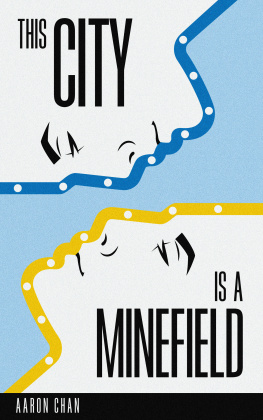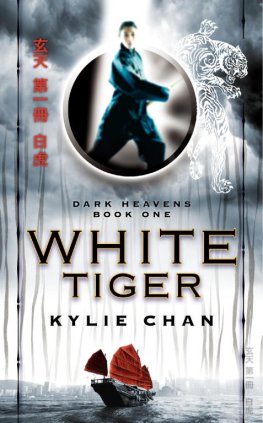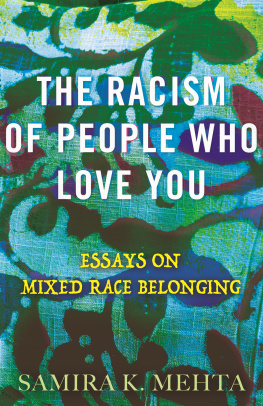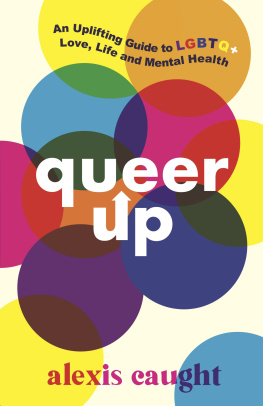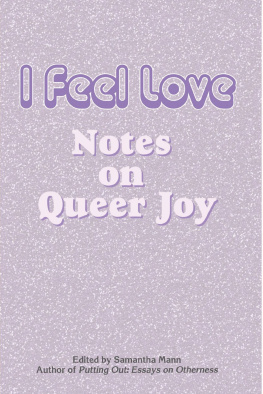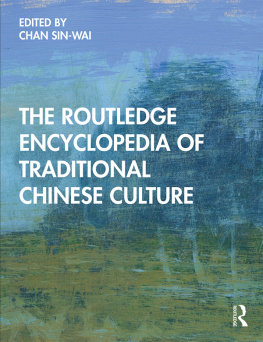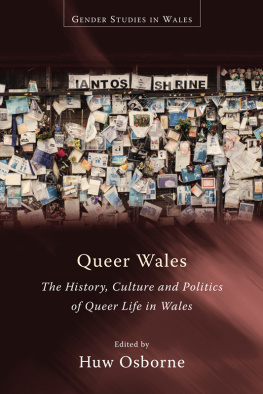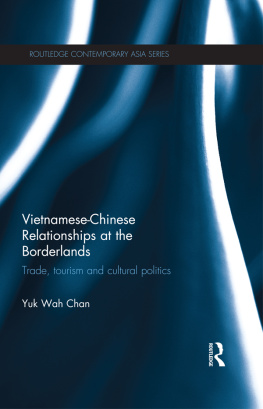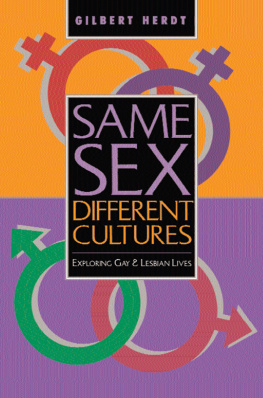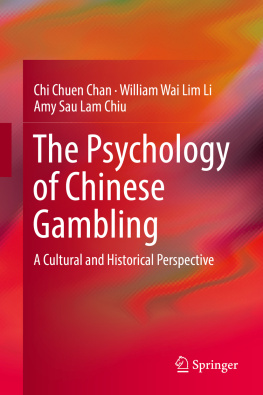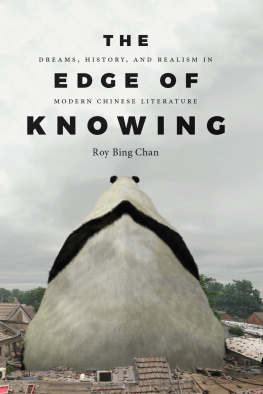
This City Is a Minefield
By Aaron Chan
Signal 8 Press
Hong Kong
Praise for This City Is a Minefield:
Soulful and intimate, Aaron Chans debut slips us between lives. By turns comic and wrenching, The City Is a Minefield is the remembrance of an ongoing search; in unanticipated ways, in revelatory moments, he finds ways to both survive in, and reimagine, our world.
Madeleine Thien, author of Do Not Say We Have Nothing; winner of the Giller Prize and the Governor Generals Award (Canada)
Aaron Chans voice is both tender and commanding as he leads you through This City Is A Minefield. Sit with him in front of his parents 70s Zenith console TV to watch Chinese soap operas or follow him through the steam-filled maze of a gay bathhouse. Wherever he takes you, he does with unflinching openness. A captivating debutIll follow Chan anywhere.
Amber Dawn, author of How Poetry Saved My Life: A Hustlers Memoir
A searing collection of contemplative and autobiographical musings that confront the challenges of a young gay mans life with astonishing courage and candour. You wont be able to put it down.
Andreas Schroeder, author of the autobiographical novel Renovating Heaven
This City Is a Minefield is a smart and beautiful collection of autobiographical essays that movingly captures and explores the gay Asian experience in the West, as Aaron negotiates and navigates the tumultuous terrain of representation and intersection of sexual identity and racethe heartbreaks, the joys, and above all, the resilience. My only wish after reading it is that the book had been published much earlier so that my younger self could have devoured and learned from it!
Edward Gunawan, writer-filmmaker
This City Is a Minefield is a well-considered and insightful rumination on Vancouver, one that both challenges and confirms its reality as a city that is multicultural in its makeup, but haunted by an enduring legacy of white hegemonypublicly, privately, and sexually. Aaron Chans voice is one that we urgently need, and thankfully have, in the form of this critical new memoir."
Wayde Compton, author of The Outer Harbour
In This City is a Minefield, Aaron Chan has drawn an honest, moving portrait of what it means to live and grow up as a third-culture kid in Vancouvers Cantonese and gay communitiesand what it means to feel never Canadian enough, never Chinese enough, and never beautiful enough to love and be loved. In crisp, spare prose, Chan strikes familiar notes in the Asian diasporic narrative while adding his own distinctive counterpoint meditations on the meaning of purpose, desire, and beauty. This is a lasting contribution to the growing canon of Asian queer literature, and a must-read for all of us who have struggled to know the meaning of home.
Kai Cheng Thom, author of I Hope We Choose Love: A Trans Girls Notes From the End of the World
This City Is a Minefield
By Aaron Chan
Published by Signal 8 Press
An imprint of Signal 10 Media, Inc.
Copyright 2019 Aaron Chan
eISBN: 978-988-77949-5-0
Smashwords Edition
Signal 8 Press
Website: www.signal8press.com
Hong Kong
All rights reserved. No part of this book may be reproduced in any form or by any means, except for brief citation or review, without written permission from Signal 10 Media, Inc.
Lyrics from the following songs have been reprinted. All reasonable efforts have been made to contact the copyright holders.
1971 A Case of You Joni Mitchell Publishing Corp., ASCAP. Written by Joni Mitchell.
2010 Cold War Ink is an Instrument Publishing, Jane Lle Publishing, Tang Nivri Publishing, ASCAP, NS. Written by Nathaniel Irvin, Charles Delbert Joseph, Janelle Mone Robinson.
2010 On the Ocean Campfire Sky Music, Low Crawl Music, ASCAP. Written by Adam Gardner, Ryan Miller, Joseph Pisapia, and Brian Rosenworcel.
Cover design: Manuela di Gioia
Art direction: Cristian Checcanin
Author photo: Erin Flegg
To Curtis (blurtis)
Table of Contents
This City
Maybe its just the way everyone grows up, but I never thought of my city as a particularly different or special place. I didnt feel lucky or privileged or complacent. Vancouver was just what it was.
Full disclosure: I was born in Burnaby, a suburb just outside of Vancouver, but I tell everyone Im from Vancouver because its where my family moved shortly after I was born and where I grew up. I think part of my feeling like Vancouver was the way it was for me was that I was a kid growing up on the West Sidein the snobby, middle-upper-class district of Kerrisdale, to be specificand the little bubble I inhabited. My limited knowledge of the world consisted of buildings and the rooms and spaces within them. My elementary school, Maple Grove Elementary, was a mere half block away from my familys three-story house. I also walked to the local community centre often, where I learned to swim; I scoured bookstacks for tiny, hidden pictures in the library downstairs for prizes during their Summer Reading Club program; and I began my very first piano lessons with a young woman named Monique. Particularly exciting and always surprising because we never paid attention to them until they were happening were Kerrisdale Days: all along the cobblestoned sidewalk of 41st Avenue, tents and tables were set out from storefronts offering free popcorn and cotton candy, balloons with company logos printed on them, and for the adults, various sales. Sidewalks were abuzz with families, children, and strollers; there was a lot of squeezing, careful maneuvering, and side-stepping involved. Ponies shouldered giggling children on the trails adjacent to the railroad tracks along East Boulevard (though I never got to ride on a pony because my parents feared animals and contact was forbidden, much to my dismay). To me, my city was pretty neat (I mean, ponies and candy! Come on!).
On Saturday mornings, my parents drove me and my two older sisters to Chinese school, which was held at a high school. Classes were taught in Cantonese by teachers who spoke little to no English, which made for fantastic learning and communication when I often could only phrase questions in English. To signal recess, a student walked up and down the halls clanging a metal bellI assumed that was what Chinese schools in Hong Kong and China were like because the high school did have a PA system. For the most part, I loathed going to Chinese School. I found it tedious and boring, the stories we read so bland and bluntly moralistic, not to mention rewriting passages from memory was utterly useless in learning the language. And because the classes gave writing and reading formal Chinese priority over conversational speaking, it was probably the reason why my oral skills barely developed. Mostly, I just sat at my desk and tried my best to look inconspicuous and somewhat attentive so I wouldnt be called on to answer questions. In all honesty, I probably picked up most of my Cantonese at home, talking with and listening to my Chinese parents (i.e. all the insults that were yelled at me and my siblings). When I think about my time studying Chinese, it triggers conflicting emotions: nostalgia mixed with disgust.
Three long hours later, my parents awaited us around the corner in my dads dull-grey 88 Hondabought the same year my twin sister Maggie and I were born. Sometimes, we had noodles and congee for lunch at a Chinese restaurant, though I have fond memories of my mother making instant noodles for us at home while we set the table. The kitchen windows fogged up from the combination of rain outside and steamy food inside (it was probably days like these that eventually conditioned me to enjoy staying home warm and cozy when it rained, which was often).
Next page
